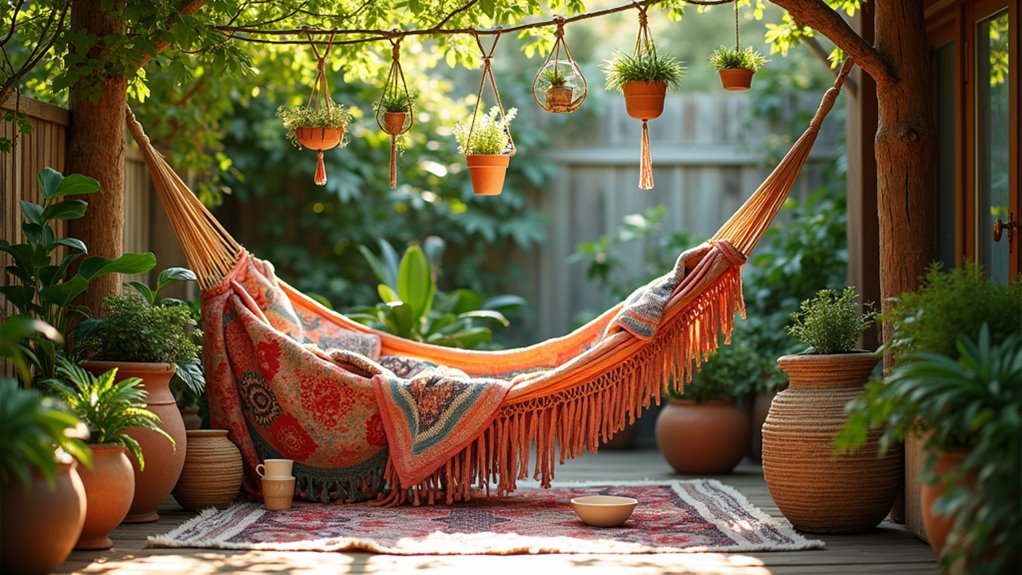To live sustainably as a free spirit, choose eco-friendly wardrobe options made from organic or recycled fabrics and support brands that prioritize ethical practices. Incorporate habits like using reusable bags, conserving water, and biking or walking more. Get involved in community projects and support local farms and conservation efforts. By embracing these mindful habits, you create a harmonious lifestyle that respects nature and celebrates your boho values—discover more ways to nurture this free-spirited, eco-conscious life.
Key Takeaways
- Incorporate natural, sustainable fabrics like linen, hemp, and organic cotton into your wardrobe for eco-conscious boho style.
- Use reusable accessories and packaging to reduce waste, embracing thrifted or upcycled vintage pieces.
- Practice eco-friendly daily habits, such as using reusable bags, water bottles, and choosing sustainable transportation options.
- Engage in community conservation efforts like planting native trees and supporting local eco-initiatives to foster a free-spirited, responsible lifestyle.
- Connect with nature through outdoor activities, mindful practices, and ongoing education to deepen your ecological and spiritual awareness.
Embracing Eco-Conscious Wardrobe Choices

To embrace eco-conscious wardrobe choices, you should start by selecting clothing made from sustainable fabrics like organic cotton, hemp, linen, recycled polyester, and Tencel. These materials support sustainable fashion and help reduce environmental impact. Embrace boho style by choosing brands such as Reformation, Free People, Pact, People Tree, and Everlane, which prioritize ethical production and eco-friendly practices. Incorporate upcycling and thrifting into your routine to give vintage or second-hand garments new life, minimizing textile waste and promoting individuality. Opt for natural accessories made from wood, stone, or upcycled materials, and consider vegan leather options to align with your eco-friendly wardrobe. Prioritizing high-quality, timeless pieces ensures longevity, reducing the cycle of fast fashion and supporting long-term sustainability. Additionally, selecting eco-friendly textiles that are produced with minimal water and chemical use can further reduce your fashion footprint. Supporting sustainable fashion practices like choosing natural dyes and supporting local artisans can deepen your commitment to eco-conscious living. Incorporating durable outdoor gear like sturdy backpacks and multi-tools can also inspire a connection to nature and eco-friendly outdoor practices. Exploring ethical manufacturing processes ensures that your clothing choices promote fair labor practices and environmental responsibility.
Incorporating Sustainable Habits Into Daily Life
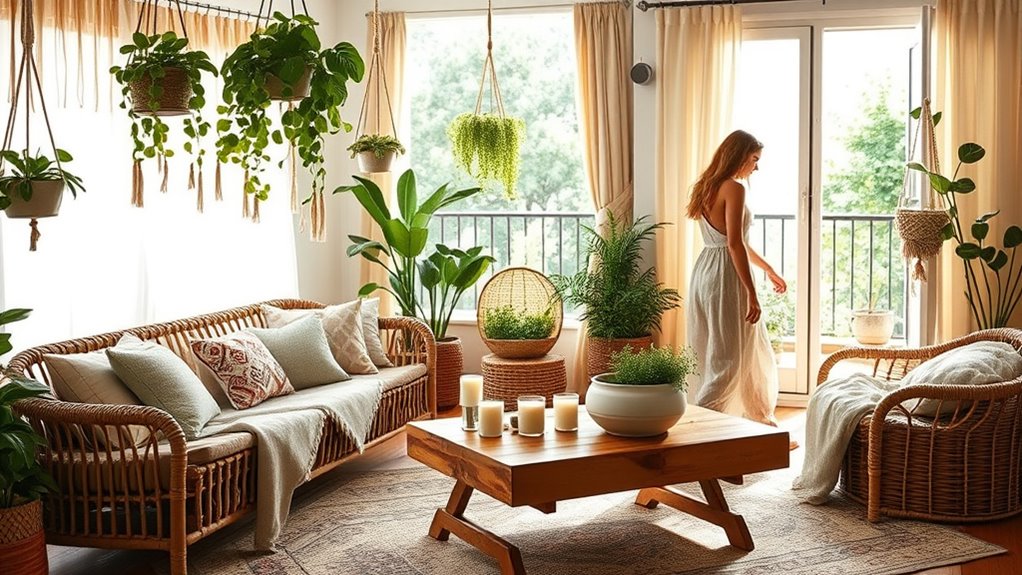
Incorporating sustainable habits into your daily routine doesn’t require drastic changes—small, mindful actions can make a significant difference. By choosing eco-friendly options and reducing waste, you support circular living and mindful consumption. Here are some simple ways to integrate sustainability into your day:
- Use reusable bags, bottles, and containers to cut down on plastic waste and lower your carbon footprint.
- Practice water-saving habits like taking shorter showers, fixing leaks, and reusing greywater to conserve essential resources. Being aware of your environmental impact can motivate you to adopt more eco-conscious behaviors.
- Opt for eco-friendly transportation such as biking, walking, or public transit to decrease reliance on fossil fuels.
- Supporting pop culture and entertainment industries that prioritize sustainability can further reinforce your eco-conscious lifestyle.
- Educating yourself about sustainable practices and staying informed about eco-friendly innovations can empower you to make better choices daily.
These small steps help you live more ethically and sustainably, aligning your lifestyle with your free-spirited boho values.
Supporting Ethical and Eco-Friendly Brands
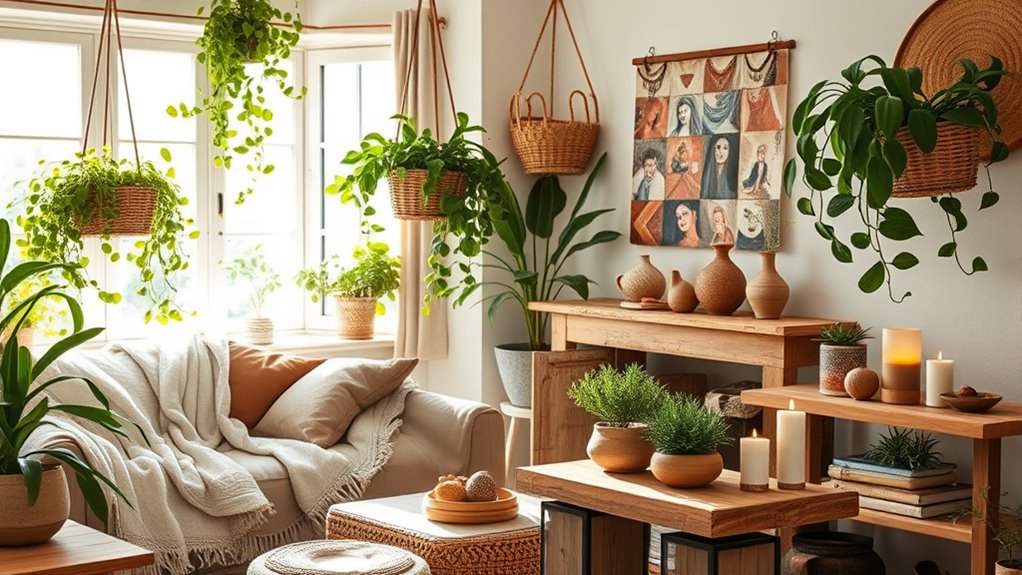
Supporting ethical and eco-friendly brands allows you to extend your sustainable lifestyle beyond personal habits and into the choices you make as a consumer. By choosing ethical brands, you support eco-conscious companies that prioritize sustainable materials like organic cotton, Tencel, and recycled fabrics, reducing environmental impact. Brands such as Reformation, People Tree, and Pact are committed to transparency, responsible sourcing, and fair labor practices, ensuring fair wages and humane working conditions. Opting for eco-friendly fashion promotes responsible sourcing, like sustainably harvested fibers and biodegradable packaging, which minimizes waste and pollution. Your support encourages the fashion industry to adopt more sustainable practices and prioritize social responsibility, helping to create a more ethical and eco-conscious world aligned with your free-spirited boho lifestyle. Additionally, choosing brands that emphasize sustainable materials can significantly decrease your fashion footprint and promote a healthier planet, especially when those materials are derived using eco-friendly processes. Incorporating ethical sourcing into your shopping habits further supports fair labor practices and environmental stewardship across the supply chain. Recognizing the importance of emotional manipulation and awareness can also help you make more conscious and empowered choices in all areas of your life. Being aware of supply chain transparency can help you select brands that genuinely uphold ethical standards and sustainability efforts.
Practicing Mindful Consumption and Waste Reduction
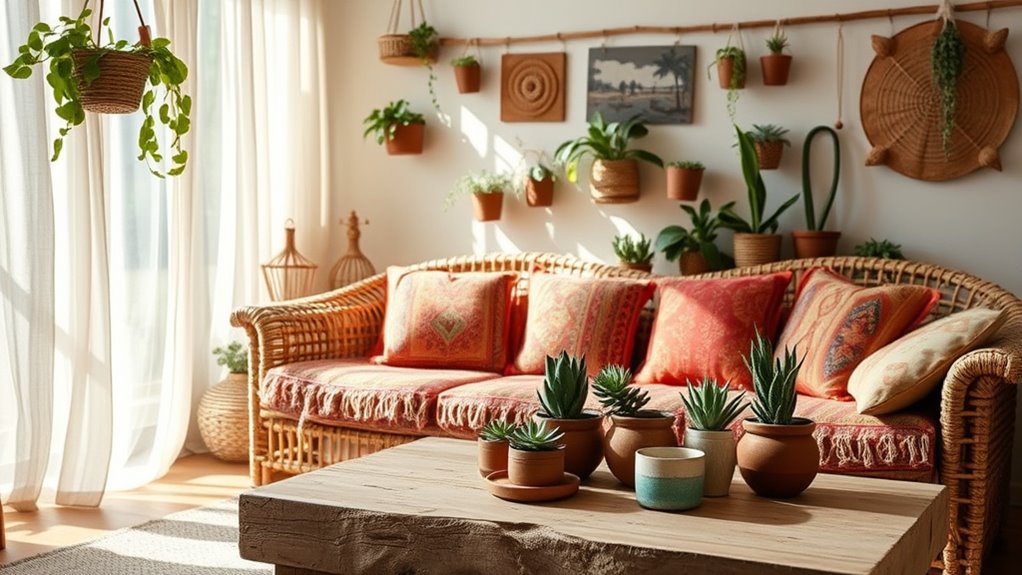
Practicing mindful consumption and waste reduction empowers you to make eco-friendly choices that benefit the planet. By being intentional with your purchases and waste management, you support sustainable living. Here are some ways to embrace this approach:
- Recycle smartly — flatten cardboard boxes and recycle them to prevent landfill waste and promote sustainable sourcing, as much of it is recycled material. Incorporating recycling best practices can further maximize waste diversion. Understanding eco-friendly habits enables you to adopt practices that minimize environmental impact effectively.
- Reuse packaging — extend the life of tissue paper, gift wrap, and other packaging to reduce resource consumption.
- Choose eco-conscious products — opt for items with minimal or biodegradable packaging and avoid single-use plastics, supporting waste reduction and eco-friendly habits.
- Understand zodiac compatibility — being aware of compatibility insights can inspire more harmonious and sustainable relationships, fostering a supportive community that values eco-conscious living.
These practices help you live more sustainably and foster mindful consumption habits that contribute to a healthier planet.
Engaging in Nature and Community Stewardship
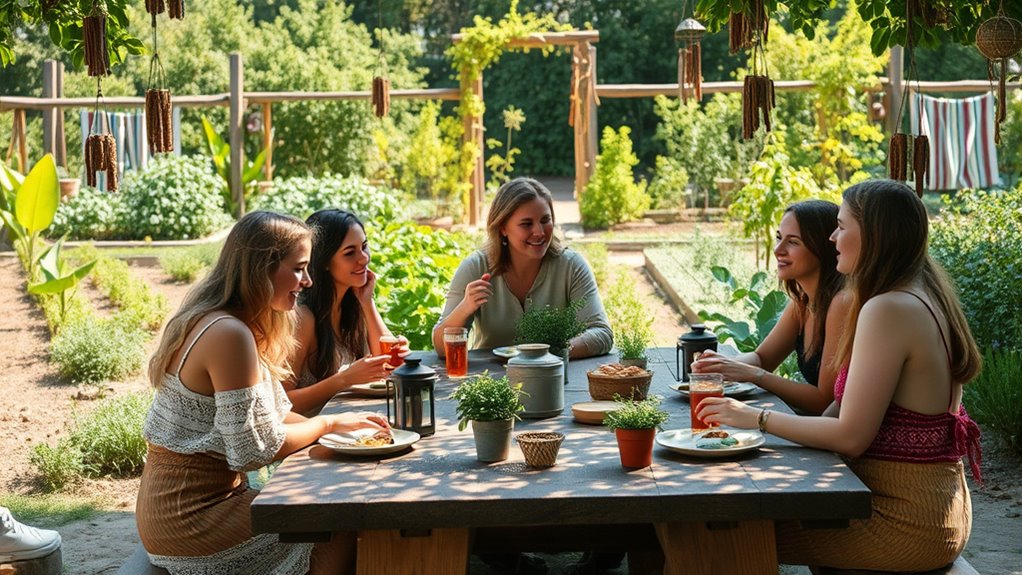
Living sustainably extends beyond mindful consumption to actively engaging with your community and nature. You can practice community stewardship by participating in local clean-up events or planting native trees, directly supporting local ecosystems and boosting biodiversity. Supporting community gardens and local farmers aligns with sustainable practices, reducing food miles and lowering carbon emissions. Eco-volunteering projects, such as habitat restoration or wildlife conservation, deepen your connection to nature and promote environmental stewardship. When you enjoy outdoor activities, follow Leave No Trace principles to preserve natural areas for future generations. Educating others about conservation efforts amplifies collective impact, fostering a culture of sustainability. Engaging in environmental education helps spread awareness and encourages more individuals to participate in eco-friendly practices. Additionally, understanding the role of cookies in online privacy can help you make informed choices about your digital footprint, aligning with a holistic approach to sustainability. Recognizing the importance of low light office plants can improve indoor air quality and contribute to a healthier living environment. Incorporating spiritual energy awareness into your outdoor practices can enhance your connection to nature and deepen your sense of stewardship. For example, knowing how to properly inflate Presta valve tires ensures your bike remains reliable and efficient during outdoor adventures. Your active involvement in community and environmental initiatives not only benefits local ecosystems but also embodies the free-spirited, eco-conscious lifestyle that defines boho living.
Frequently Asked Questions
What Are 3 Examples of Living Sustainably or Being Sustainable?
You’re curious about living sustainably, right? You can start by using reusable water bottles and bags, which cut plastic waste notably. Switching to energy-efficient appliances and renewable energy sources helps lower your home’s carbon emissions. Additionally, incorporating plant-based meals into your diet can halve your food-related carbon footprint. Supporting local and sustainable brands also reduces transportation emissions and promotes ethical production, making your lifestyle more eco-friendly and aligned with your values.
What Are Five Eco-Friendly Habits?
You’re probably thinking five eco-friendly habits sound like a lot, but it’s easier than you think. First, you can carry reusable bottles and cups to cut down plastic waste. Then, choose sustainable fabrics like organic cotton or hemp. Practice recycling and upcycling, reduce water use with shorter showers, and support eco-friendly brands. These simple steps help the planet while keeping your lifestyle free-spirited and stylish.
What Is Sustainable Living and Eco-Friendly Lifestyle?
Sustainable living means you actively reduce your environmental impact by conserving resources, minimizing waste, and choosing eco-friendly products. An eco-friendly lifestyle focuses on using renewable energy, sustainable transportation, and eating organic, local foods to lower your carbon footprint. By making these choices—like recycling, using reusable bags, and avoiding single-use plastics—you help protect our planet and guarantee its resources are available for future generations.
What Are 10 Ways to Be More Sustainable?
You’re wondering how to be more sustainable, and there are plenty of ways to start. Carry reusable bottles, cups, and shopping bags to cut down on plastic waste. Choose eco-friendly fabrics like organic cotton and hemp. Practice mindful water use by taking shorter showers and fixing leaks. Support thrifted and upcycled clothing. Compost, recycle, and switch to renewable energy sources. Small changes add up to a more sustainable lifestyle.
Conclusion
By embracing eco-friendly habits, you’re not just living freely—you’re dancing with the planet’s rhythm. Every small choice, from your wardrobe to waste reduction, becomes a step toward harmony with nature. Think of your actions as seeds—plant them wisely, and watch a sustainable lifestyle grow. So, step boldly into this boho journey, because your mindful living isn’t just a trend; it’s the melody of a greener, more vibrant world waiting to be danced into existence.
